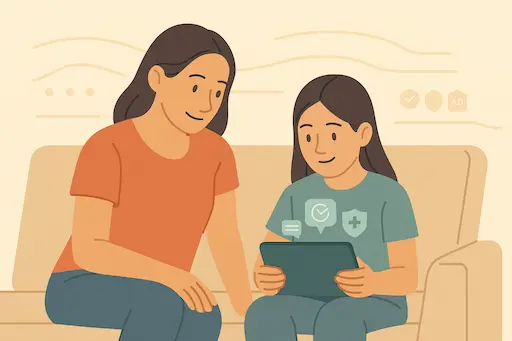Why I Don’t Just Lock My Kid’s Phone: A Better Way to Raise Digital-Ready Kids
TL;DR
Locking kids out of the digital world doesn’t protect them — it just delays their learning, fosters secrecy, and damages trust. Instead of bans and blockers, we need to teach kids how to use technology safely and wisely. That means guiding, not just guarding.

Equipping kids with skills is often more helpful than blanket bans.
The Problem with “Just Lock It Down”
It’s a tempting response. We see stories about online predators, screen addiction, inappropriate content, and we react: “I’ll just keep my kid off devices as long as possible.”
But here’s the hard truth:
Devices are not going away.
And kids will find a way to access them — whether it’s a friend’s iPad, the school Chromebook, or that “old” phone you forgot was still logged in.
When we rely on lockdowns and bans as our main strategy, we teach kids one of two things:
- How to get around the rules (often behind our backs).
- That we don’t trust them — or worse, that they can’t trust us when they mess up.
Neither outcome prepares them for the real world.
What Happens When the Gate Finally Opens?
Let’s say you manage to keep your child mostly offline until they’re 13, 15, maybe even 17. Then what?
Suddenly, they’re handed a smartphone or laptop and told:
“Okay, off you go. Be safe.”
Except they’ve never been taught how.
They’ve never learned:
- how to set boundaries for themselves
- how to spot manipulative online behavior
- how to respond to uncomfortable messages
- or even just how to manage time when entertainment is a swipe away
That’s not protection.
That’s sending them into a storm with no compass.
The Sneaky Workarounds Start Early
I’ve talked to parents whose kids figured out VPNs and burner accounts before high school. One mum told me her 11-year-old borrowed a friend’s tablet to make a “secret TikTok” because “all the other kids had one.”
Not because they were bad kids.
Because they were curious. And excluded. And clever.
When we make tech a forbidden fruit, we accidentally make it more enticing.
And when our only tools are bans and punishments, our kids learn not to tell us things — even when they want help.
A Better Way: Teach. Guide. Empower.
At Private by Design, I believe in treating privacy and digital habits like any other life skill.
You wouldn’t throw a 16-year-old the car keys without ever discussing road rules.
And you wouldn’t ban bikes forever just because your toddler scraped a knee.
We don’t need to fear technology — but we do need to teach it.
That means:
- starting early with small conversations (what’s an ad? why do games want your email?)
- using real moments as teaching opportunities (“Hey, let’s talk about that pop-up we just saw…”)
- co-creating limits rather than imposing silent surveillance
- building trust so your child feels safe telling you when something goes wrong
It’s not about letting them do anything. It’s about giving them the tools to handle everything.
Social Lives Are Digital Now — That’s Okay
When I was a kid, we hung out at the park, or biked over to a friend’s house. Today’s kids?
They hang out on Roblox. Or chat in group threads. Or build worlds in Minecraft together.
It’s still friendship. Still laughter. Still bonding. Just… different.
And that’s okay.
Parents don’t need to love every app, but we do need to understand that digital connection is real. Dismissing it outright only drives a wedge between us and our kids.
My Approach, In Practice
Here’s what this looks like in my house:
- Devices have limits, but my daughter knows what they are — and why they exist.
- We talk openly about risks and responsibilities, just like we would about driving or going out alone.
- She knows she can come to me if something feels off — and that she won’t get in trouble for being honest.
- We use privacy tools together, and she’s part of the decision-making process.
It’s not perfect. But it’s honest. And it’s working.
Let’s Raise Tech-Ready Kids
We’re raising kids in a digital world — whether we like it or not.
Our job isn’t to keep them away from every risk.
It’s to equip them to navigate it safely, confidently, and with integrity.
That’s what I want Private by Design to stand for.
Not fear.
Not false control.
But empowered parenting in a connected age.
Let’s raise kids who are ready — not restricted.